- Home
- Roger Zelazny
Changeling Page 14
Changeling Read online
Page 14
I have seen it before, joined with the others. Gather your things, come mount me and let us be on our way to wherever you would go now.
You should rest after such a struggle.
A dragon rests on the wing. Let us leave this place if we are finished here.
Pol turned to Nora.
“He is able to go on now. How about you?”
“I’d like to get out of here myself.”
He looked at her for the first time in a long while. Dishevelled and moist with perspiration, she still clutched the blade in her right hand. But he saw no signs of injury.
Noting his regard, she relaxed her grip on the weapon and sheathed it. She smiled.
“All right?”
“All right. Yourself?”
He nodded.
“Then let’s get our stuff together and move on. Have you any idea how he knew we’d be here?”
“No,” she said. “You say that the things he does are not really magic—but they do seem that way to me. It’s just that he has a different style.”
“I hope you like my style better.”
“So far,” she said.
As Moonbird lifted them above the desert and bent his course northward, the skies were clear and the sun had already begun its western plunge.
Land where you would to forage, Pol told him. Once we hit the northern sea, we’ll be island-hopping—and the maps are not all that good on distances.
I have been this way before, Moonbird told him. I will feed in time. Now, will you make some music to warm my cold reptilian heart?
Pol unearthed his guitar, tuned it and struck a chord. The wind whistled accompaniment as the land unrolled like a dry and mottled parchment beneath them.
XVII
That night, as they lay listening to the sound of waves and breathing the smell of the sea on a small island far from the mainland, Moonbird sought sustenance for afield and Nora studied the rod from the pyramid.
“It does have a magical look, a magical feel to it,” she said, turning it in the moonlight.
“It is that,” Pol replied, stroking her shoulder, “and the other two pieces should do more than just add to its potency. Each should multiply the power of those which precede, several times.”
She put it aside and reached out to touch his wrist.
“Your birthmark,” she said. “They weren’t really wrong—the villagers. You are of that tribe with your feet in hell and your head in heaven.”
“No reason to throw rocks,” he said. “I wasn’t doing anything to them.”
“They’d feared your father—once he got involved in blood sacrifices and the treating with unnatural beings who had to be paid in human lives.”
Pol shrugged.
“ . . . And they took his life to balance accounts. Also, my mother’s. And they wrecked the place. Didn’t that pretty much square things?”
“At the time, yes—as I understand it. But you stirred up fears as well as leftover hatred. Supposing you’d come home to avenge their deaths? You did have that in mind, too, didn’t you? That’s what that Mouseglove person said.”
“Not at the time, though. I hadn’t even realized who I was when they attacked me. But it made it easier for me to hate them when I did learn.”
“So, in a way they were right.”
Pol took the rod into his hands and stared at it.
“I can’t deny it,” he said, finally. “But I didn’t follow through on it. I’ve harmed none of them.”
“Yet,” she said.
He turned onto his side and glared at her, the covers slipping from his shoulder.
“What do you mean ‘yet’? If I’d been that serious about it, it would have been my first order of business.”
“But you still dislike them.”
“Wouldn’t you, in my position? So for as I’m concerned, they’re not very likable people. And if they’d handled Mark a little differently, they probably wouldn’t have him on their backs.”
“They are quick to react to the unknown. Theirs is a settled way of life—traditional, slow to change. They saw both of you as threats to it and acted immediately to preserve it.”
“Okay. I can see that. But I can understand something without liking it. I’ve called off the feud I almost declared on them. That should be enough.”
“Only because you’ve got a bigger one on your hands. You know that if you don’t destroy Mark he’s going to destroy you.”
“I have to operate under that assumption. He’s given me every indication. The time is past for trying to talk with him.”
She was silent for a long while.
“So why aren’t you like the others?” he asked. “You were a friend of his and now you’re hanging around with a dark sorcerer—helping me, in fact.”
She remained silent. Then he realized that she was crying softly.
“What is it?” he said.
“I’m a pawn,” she answered in a low voice. “I’m the reason you got involved—you were trying to help me.”
“Well—yes. But sooner or later Mark and I would have met, and the results would probably have been the same.”
“I’m not so sure,” she said. “He might have been more inclined to listen to you if it hadn’t been for me. But he was jealous. You might have become friends—you have much in common. If you had—think what an alliance that might have been—a sorcerer and a master of the old science arts—both out for revenge on my homeland. Now that cannot be, and the wheels are turning to bring you into a struggle to the death. Supposing I really hated you both? It wouldn’t make a bit of difference—now.”
“Do you?” he asked.
“ . . . And I’d be damned if I’d tell you.”
“You wouldn’t have to sleep with me. Once those wheels are in motion a roll in the hay wouldn’t alter them.”
“It might make the winner more disposed to leave us alone, out of a certain fondness.”
“And telling him about it might have just the opposite effect.”
“It’s a good thing I’m talking principles and not cases,” she replied, touching his shoulder again. “As I said, I do feel like a pawn, though, and you wanted to know why. As for your last question, I was answering it as things could be, not informing you. It was the wrong question, anyhow.”
“You’re too tough to be a pawn,” he said, “and you know who the only woman on the board is. And we can sleep with a sword between us if you want.”
“It is not cold steel that I want,” she said, moving nearer.
He saw a pale blue strand drifting by, but he ignored it.
Everything shouldn’t be gimmicked, he thought. Should it?
He heard the voices again, in that place where he drifted between sleep and wakefulness.
“Mouseglove, Mouseglove, Mouseglove . . . ”
Yes. It was not the first time he had heard them—weak yet insistent, calling to him—and on awakening he always forgot the small chorus. But this time there seemed more strength to the calls, almost as if he might come away with the memory, this time . . .
“Mouseglove!”
He began to remember his circumstances, sprawled in the secret apartment atop Anvil Mountain, unwilling guest of Mark Marakson, a.k.a. Dan Chain, taboo-breaking engineer from the east village. He was trying to find a way out, past the man’s gnome-like legions and electronic spies, trying to learn to fly one of the small craft—small, yes, not like the battle-wagons with the six-man crews, two cannons and a rack of bombs he had seen take off earlier, sailing in every which direction across the sky, rotors whirling, wings tilting all about them—small, just right for himself and the jewelled figurines which would make him his fortune . . .
“Mouseglove!”
He was moved a jot and two tittles nearer awakening yet still the chirping cries came to him. It was almost as if . . .
He tried. Suddenly, somewhere inside himself, he answered.
“Yes?”
“We bring warning.”
/> “Who are you?”
Immediately, his dreamsight began to function. He seemed to stand at the center of a low-ceilinged room, illuminated by seven enormous candles. A figure, human in outline, stood behind each of them. The flames obscured the faces, and no matter how he turned or stared, nothing more of them was revealed to him.
“You sleep with the figures beneath your head,” said the one at the extreme left—a woman’s voice—and immediately he knew.
Four men, two women and one of uncertain gender, out of red metal, studded in peculiar places with jewels of many colors . . . Somehow, they addressed him now:
“We gained power when the Triangle of Int was unbalanced by the heir of Rondoval,” said the second figure—a man.
“We are the spirits of sorcerers vanquished by Det and bound to his statuettes,” said the third—a tall man.
“We exist now mainly to serve him or his successor,” said the fourth—a woman with a beautiful soprano voice.
“We see futures and their likelihoods,” said the fifth—a gruff-voiced man.
“We have come into your possession for a reason,” said the sixth—of uncertain gender.
“ . . . For we can to some extent influence events,” finished the man on the right—the seventh.
“What is your warning?” asked Mouseglove. “What do you want?”
“We see a great wave about to break upon this plane,” said the first.
“ . . . At this place,” said the second.
“Soon,” said the third.
“ . . . To settle the future of this world for some time to come,” said the fourth.
“Pol must be protected,” said the fifth.
“ . . . At this point of the Triangle,” said the sixth.
A map was lying before him on the floor. It was actually a part of the floor, he now realized, cunningly inscribed. It seemed that it had been there all along. As he looked, one spot grew light upon it.
“Steal maps, steal weapons, take Mark’s flier and go to that place,” said the seventh.
“Take Mark’s flier?” he asked.
“It is the fastest and is capable of the greatest range,” said the first.
“Pol isn’t a bad guy,” Mousegiove said, “and I wish him no ill, but my intention is to get as far away from him and Mark as soon as I can, as fast as I can.”
“Your willing cooperation would make things easier,” said the second.
“ . . . But it is not absolutely necessary,” said the third.
“ . . . As our power rises,” said the fourth.
“I’ve never had booty talk back to me before,” Mouseglove replied, “except for a parrot, when I was a lad. But that doesn’t count. You’re asking too much. I’ve led a dangerous life, but this was to be my last big risk. You are my retirement security. I want nothing to do with your breaking wave.”
“Fool,” said the fifth.
“ . . . To think you have a choice,” said the sixth.
“You have walked a charmed line since the day you entered Rondoval,” said the seventh.
“We had a part in everything that brought you to this point,” said the first.
“Even our theft,” said the second.
Mouseglove chuckled.
“If I have no choice, then why do you request my cooperation?” he asked. “No. Perhaps I was manipulated up to this point. Now, though, I think you need my help and your power has not risen sufficiently to insure it. I’ll take my chances. The answer is no.”
Silence followed. He felt himself the object of intense scrutiny.
Then, “You are shrewd,” said the third, “but incorrect. The answer is merely that it would be easier for us with your cooperation. We could devote our energies to other matters than your coercion.”
“We can see that you are suitably rewarded,” said the fourth.
“Rewards are of no benefit to a dead man,” he stated. “No deal.”
“You will not like what Mark does to this world,” said the fifth.
“I’ve never been totally happy with it the way that it is,” he replied. “But I get by.”
“For your own protection then, learn to use the grenades. They practice with them on the southern rim,” said the sixth, neutral-voiced.
“ . . . And get the maps,” said the seventh.
“That much I intended anyway,” Mouseglove answered. “But I am not going to the place you showed me and do any fighting there.”
The candles flickered, the room expanded toward nothingness and his consciousness faded. The last thing that he heard was the sound of their voices, laughing.
Three flying boats approached Castle Rondoval cautiously, guns loaded and swiveling in pace with the vessels’ circling movements. As the circles diminished, the first battle-wagon discharged a shot across the battlements. At this point, all three were poised to withdraw and regroup in the face of a severe reaction. Nothing however, followed.
The circling continued for the better part of an hour, though no more shots were fired. Finally, the vessels—very close, very low now—broke formation to drift about among the still-standing towers, to hover while their occupants peered through windows and damage gaps in the walls. Slowly, then, one of the three floated to a landing in the main courtyard. None of its occupants emerged immediately, and the other two ships moved above it, guns ready. A quarter of an hour passed, and nothing stirred but the leaves on the trees and a lizard on the wall.
At last, a large hatch at the rear fell open and five small figures emerged, weapons held ready, to rush for cover in five different directions, dropping to earth and remaining motionless as soon as it was achieved. After several minutes, they rose and began to move, entering the castle.
It was over an hour before they emerged, their attitudes more casual, their weapons slung. Their leader signalled to the other two vessels, which immediately began to descend. When they were down, five more individuals emerged from each of them.
The fifteen men stood about, conferring on the building’s layout. At last, they returned to the vessels to bring forth heavier weapons for emplacement inside.
Later that afternoon, when Rondoval had been secured, one of the vessels departed, leaving behind a dozen men, one on permanent duty in each of the remaining ships, the other ten set to patrol the castle.
The departing battle-wagon spiraled outward, moving more rapidly than on its inward journey, ship’s telescope sweeping the rocky heights and, finally, the forested depths of the vicinity. Still, it was nearly an hour before a small group of centaurs was detected in a distant glade.
The sky boat dropped immediately to a point near treetop-level, out of line of sight of the creatures. It descended into the first clear area it reached, where its engines died and its hatch opened. The five infantrymen emerged, moving away into the trees, the pilot remaining behind with the vessel.
They passed slowly and silently through the forest, having spent basically predatory existences before their present level of culture had been thrust upon them. Now they fanned, like a well-organized hunting team, moving to surround their prey. As they neared the glade, they communicated entirely by a kind of sign language, messages passing from man to man about the circle they formed. Taking up their positions, they studied the disposition of the eight centaurs in the area and commenced a rapid and elaborate sign discussion as to target assignments. Then they raised their weapons.
The signal was then passed, and each of the five fired one round. Five centaurs jerked and bled. Two fell immediately. None of the riflemen paused to reload his single-shot weapon. Instead, they rushed forward to use the butts as clubs, only two finally drawing the blades they wore at their sides. There were only a few cries from the centaurs, but the smells of sweat and urine were suddenly strong upon the air.
One of the wounded ones rose unexpectedly, crushing an attacker’s skull with her forehoofs. She was beaten down along with the three unwounded. The lightest of the uninjured had his legs bound together
and hands tied behind him. Three of the remaining attackers slung their weapons and moved to transport him, the fourth reloading and covering them.
They bore their burden back through the woods, encountering no resistance. They entered and secured the vessel. Shortly thereafter, the rotors became shimmering blurs and the ship rose slowly, took its course and drifted southward, acquiring altitude, its speed slowly mounting as it passed above the deepening forest.
Moonbird flew above the dark, convoluted patterning—a large, flat design within the field of rock—at the other end of the long island from the city and its ports. Shadows cast by the morning’s sun broke the scheme in numerous places, and the entire prospect caused a swimming effect whenever one stared for too long. Pol gestured as if to interrupt his vision, for countless dark strands now drifted from it, further blurring, confusing the image.
Some power lies there, beneath the ground, Moonbird remarked. This is the place?
Yes.
Pol scanned the skies carefully, then looked down once again. There was one break, at the pattern’s northern edge, where the strands billowed like an inkpot dropped into an aquarium.
Take us down at that far end, where the stand of trees comes in like a spear point, nearest to the thing.
Moonbird slowed and began his descent. Pol strained forward, studying the terrain. Soon, he saw that the marked area was an elaborate, monolithic construction, the dark lines representing a continuous overhead opening presumably running the entire length of many interconnected interior corridors for purposes of some small illumination. The structure itself stood perhaps twice his height above ground level. As they slowed to land, Pol saw the single pale jade strand he sought among the masses of sable and ochre lines. A faint bellowing noise reached his ears from some undeterminable point.
As he touched the ground, Moonbird asked:
Play me one more song.
Do you fear that you will never hear one again?
Humor an old sauroid servitor. Dragons have their reasons.
Very well.
Pol uncased his guitar, not even bothering to dismount.
“What are you doing?” Nora inquired.
“Request performance,” he answered, and he began a long, slow, nostalgic ballad.

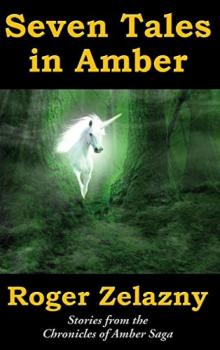 Seven Tales in Amber
Seven Tales in Amber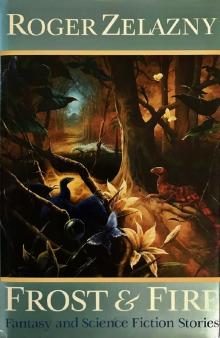 Frost and Fire
Frost and Fire Doorways in the Sand
Doorways in the Sand Unicorn Variation
Unicorn Variation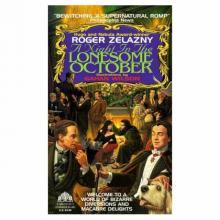 A Night in the Lonesome October
A Night in the Lonesome October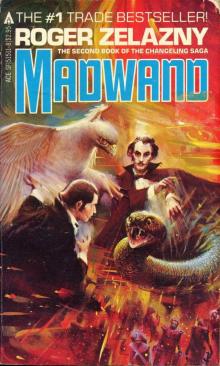 Madwand
Madwand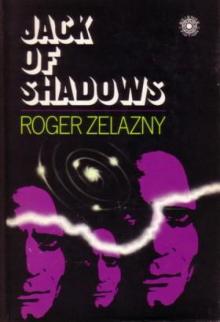 Jack Of Shadows
Jack Of Shadows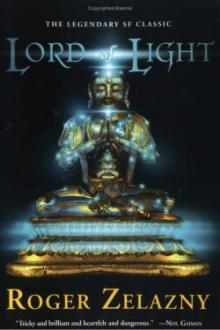 Lord of Light
Lord of Light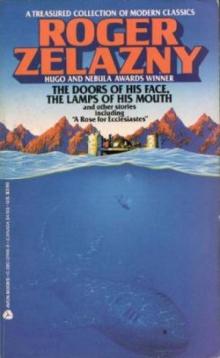 The Doors of His Face, The Lamps of His Mouth and Other Stories
The Doors of His Face, The Lamps of His Mouth and Other Stories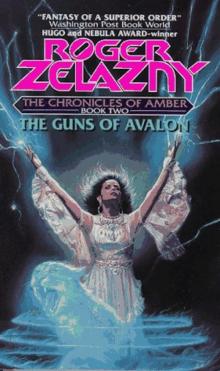 Guns Of Avalon tcoa-2
Guns Of Avalon tcoa-2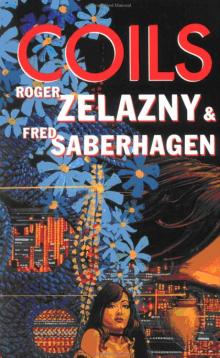 Coils
Coils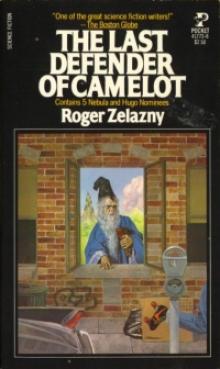 The Last Defender Of Camelot
The Last Defender Of Camelot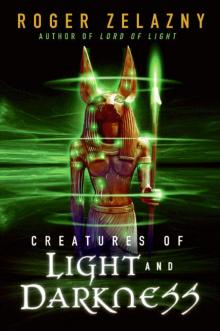 Creatures of Light and Darkness
Creatures of Light and Darkness This Immortal
This Immortal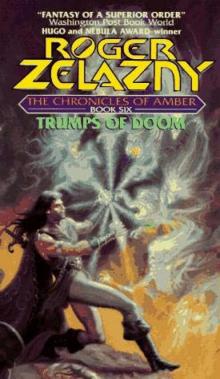 Trumps of doom tcoa-6
Trumps of doom tcoa-6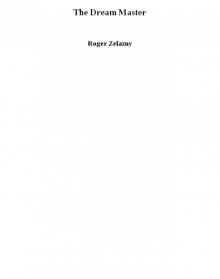 The Dream Master
The Dream Master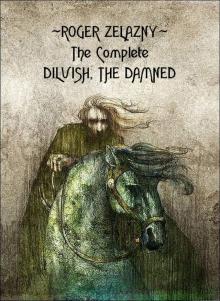 The Complete Dilvish, The Damned
The Complete Dilvish, The Damned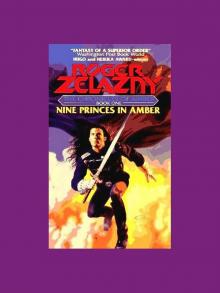 Nine Princes in Amber
Nine Princes in Amber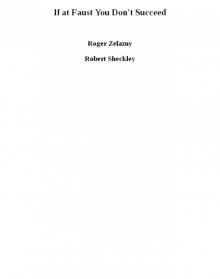 If at Faust You Don't Succeed
If at Faust You Don't Succeed Here there be dragons
Here there be dragons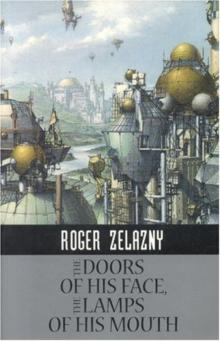 The Doors Of His Face, The Lamps Of His Mouth
The Doors Of His Face, The Lamps Of His Mouth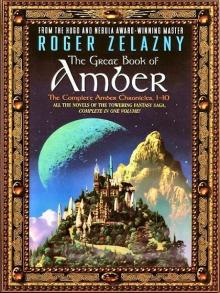 The Great Book of Amber - Chronicles 1-10
The Great Book of Amber - Chronicles 1-10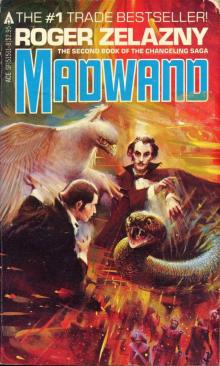 Madwand (Illustrated)
Madwand (Illustrated)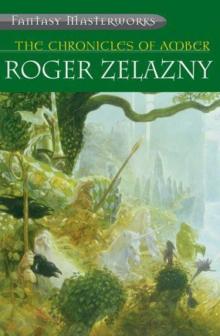 The Chronicles of Amber
The Chronicles of Amber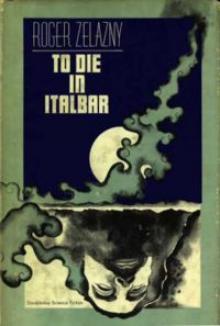 To Die In Italbar
To Die In Italbar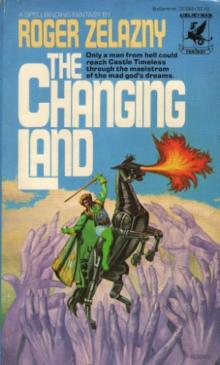 The Changing Land
The Changing Land The Furies
The Furies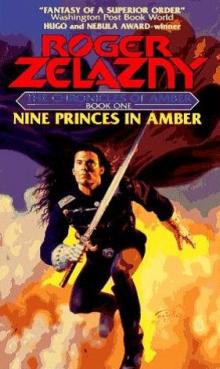 Nine Princes In Amber tcoa-1
Nine Princes In Amber tcoa-1 Last Of The Wild Ones
Last Of The Wild Ones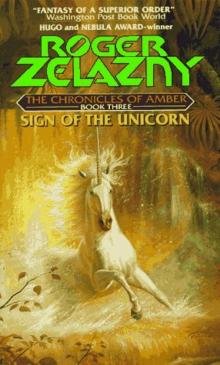 Sign of the Unicorn tcoa-3
Sign of the Unicorn tcoa-3 My Name is Legion
My Name is Legion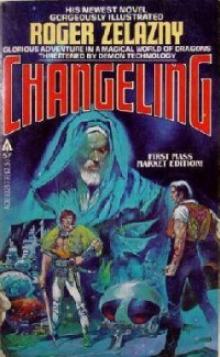 Wizard World 1: Changeling
Wizard World 1: Changeling Changeling
Changeling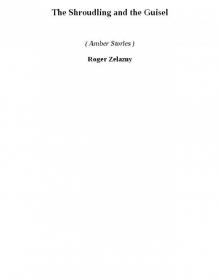 The Shroudling and the Guisel (amber stories)
The Shroudling and the Guisel (amber stories)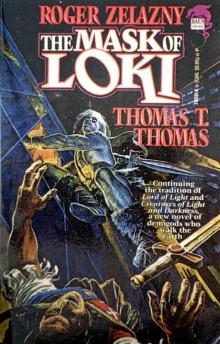 The Mask of Loki
The Mask of Loki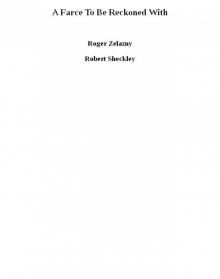 A Farce To Be Reckoned With
A Farce To Be Reckoned With Roadmarks
Roadmarks When Pussywillows Last in the Catyard Bloomed (rtf)
When Pussywillows Last in the Catyard Bloomed (rtf)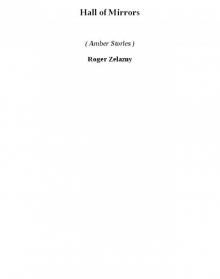 Hall of Mirrors (amber stories)
Hall of Mirrors (amber stories)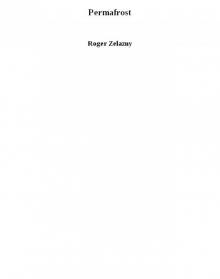 Permafrost
Permafrost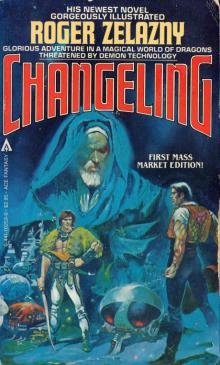 Changeling (Illustrated)
Changeling (Illustrated)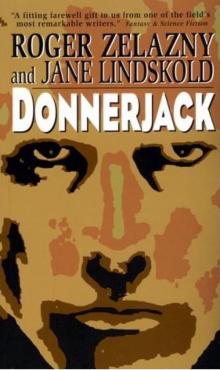 Donnerjack
Donnerjack Shadows & Reflections: A Roger Zelazny Tribute Anthology
Shadows & Reflections: A Roger Zelazny Tribute Anthology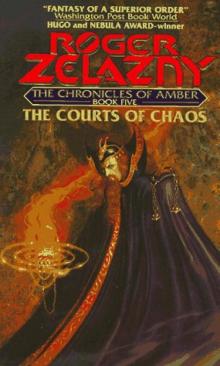 The Courts Of Chaos tcoa-5
The Courts Of Chaos tcoa-5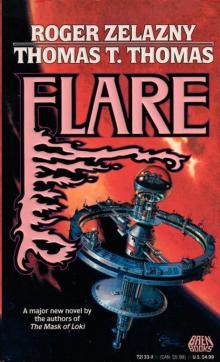 Flare
Flare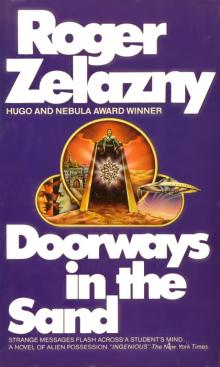 Doorsways in the Sand
Doorsways in the Sand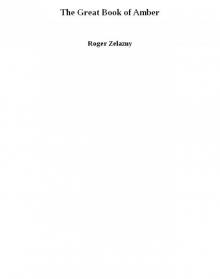 The Great Book of Amber
The Great Book of Amber Home Is the Hangman
Home Is the Hangman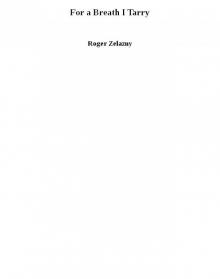 For a Breath I Tarry
For a Breath I Tarry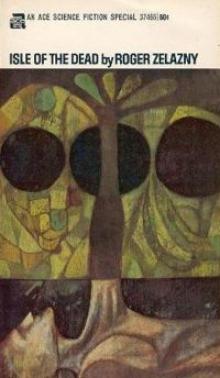 Isle Of The Dead
Isle Of The Dead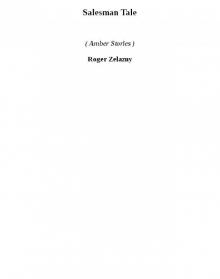 Salesman Tale (amber stories)
Salesman Tale (amber stories) Dismal Light
Dismal Light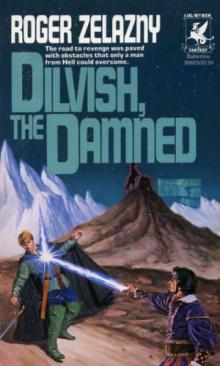 Dilvish, The Damned
Dilvish, The Damned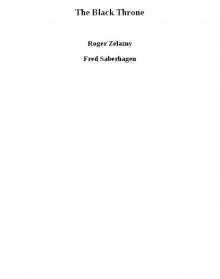 The Black Throne
The Black Throne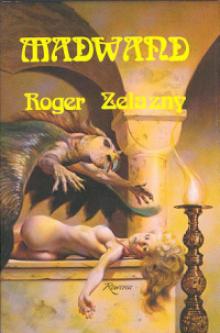 Wizard World 2: Madwand
Wizard World 2: Madwand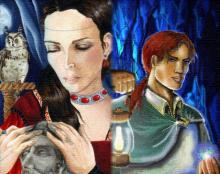 The Salesman's Tale
The Salesman's Tale